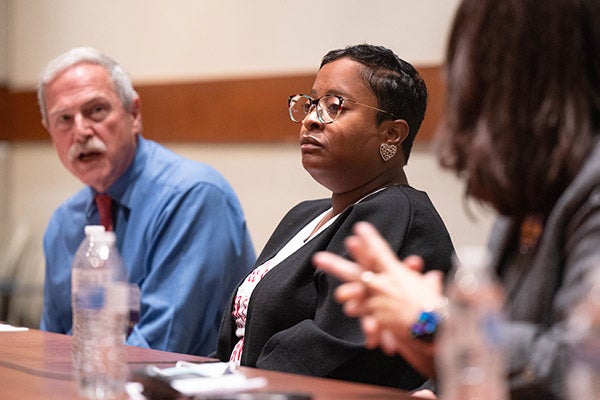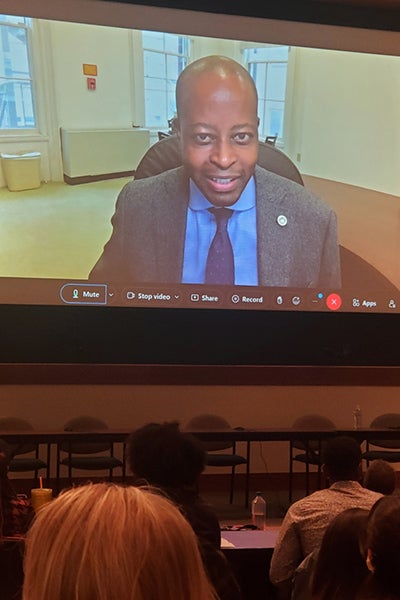Sickle cell disease conference brings patients, providers together to learn, advocate
The inaugural Tate Holbrook Annual Sickle Cell Disease Update brought patients, providers and experts together Sept. 30 at the East Carolina Heart Institute to share information on history, treatments, impact and advocacy for patients with sickle cell disease.
The event, hosted by East Carolina University’s Comprehensive Sickle Cell Program and the Division of Hematology and Oncology in the Department of Pediatrics at ECU’s Brody School of Medicine, brought nearly 80 participants from across the country to the sessions and panel discussion.
For patients, the conference offered not only a chance to connect with other patients and with providers, but also to be heard.
Majara Mooring, a sickle cell disease patient, encouraged others to come to the conference to learn more about the disease and how to best care for patients.

Majara Mooring, a sickle cell disease patient, participates in a patient/provider panel during the Tate Holbrook Annual Sickle Cell Disease Update on Sept. 30. (Photo by Cliff Hollis)
“Living with sickle cell can be very hard,” Mooring said. “I’ve lived with it basically all my life. I think physicians can learn from patients by asking questions and listening to our concerns.”
Mooring also participated in the patient/provider panel during the conference.
“I hope everyone can actually learn about the disease; it’s very important,” she said. “Know the patient, and know yourself as a patient.”
Dr. Beng Fuh, professor in the ECU Department of Pediatrics, director of pediatric hematology and oncology and director of the ECU Comprehensive Sickle Cell Center, introduced Tate Holbrook, a retired pediatric hematologist who founded ECU’s Comprehensive Sickle Cell Disease Program in 1999, for whom the conference is named.
“He had a vision” that he could set up a sickle cell program in Greenville, Fuh said of Holbrook, adding that what Holbrook accomplished has allowed the program to grow and meet the needs of patients across eastern North Carolina and beyond.
Holbrook presented “History of the Sickle Cell Program,” an overview of the creation, growth and services of the ECU Comprehensive Sickle Cell Center available to patients today.
Holbrook joined the faculty of ECU’s Department of Pediatrics in 1979, when the medical school was new. The center started not long after Holbrook’s arrival, in part because pediatricians consistently heard about children living with sickle cell disease in eastern North Carolina. At the time, Holbrook said, sickle cell disease was the most studied genetic disorder in the world. The information on treatment and preventive care was “woefully lacking,” he said.
Holbrook shared stark statistics on sickle cell disease, including that 25% of young sickle cell patients die because of lack of care, lack of provider knowledge and having to wait for emergency care. Health disparities, particularly those exacerbated by race, also contribute to the high death rate.
North Carolina was one of the first states to start screening for sickle cell disease in the 1970s, and over the years state programming helped boost resources for understanding and treating sickle cell disease.

Dr. Wayne Frederick, president of Howard University, surgical oncologist and sickle cell disease patient, presents the virtual keynote address during the Tate Holbrook Annual Sickle Cell Disease Update. (Photo by Spaine Stephens)
Holbrook said the journey to where the Comprehensive Sickle Cell Center is today is in large part because of patients and their families.
“I’ve been loved by many of our patients and families,” he added. “It’s almost as if they have said to me, ‘Grant us your friendship.’ I want you to remember that. All of us in medicine need to be granted the ability to make friends with our patients. Our families have been empowered to learn about their children with sickle cell disease, to expect the best comprehensive acute and chronic care possible and to experience the power of hope.”
Holbrook said the center enables patients and families to oversee their own care and be part of the decision-making processes related to their child’s health.
“I have learned from these patients and families to listen, learn, share and care,” he said. “We’re all family at ECU.”
Dr. Wayne A.I. Frederick, president of Howard University and the Charles R. Drew Professor of Surgery, gave the keynote address, “How Warriors Can Arm Themselves with Knowledge to Pursue Their Biggest Ambitions.”
Frederick grew up in Trinidad and Tobago and was diagnosed with sickle cell disease at birth. He is now a surgical oncologist at Howard University Hospital and encourages others with the disease to surpass obstacles the condition presents and to advocate for a cure.
Frederick said he had access to a sickle cell center as a young adult that provided resources and coping mechanisms for living with sickle cell anemia. Such centers, he said, are vital to patient and family experiences as they navigate the disease, as well as helping instill confidence to live as fully as possible.
“I think it’s important to be active and be involved in things that you enjoy,” he said. “I have been very fortunate to be blessed with a support system around me that has been absolutely exceptional.”
In terms of how care is provided to sickle cell patients, Frederick said trust must be established with patients through understanding their specific situations.
“We must recognize that we have to meet patients where they are,” he said. “Medicine and care is a partnership; it’s a partnership built on trust between a doctor and patient.”
That partnership also extends to sickle cell communities that should build collaboration “and come together so that we can be strong advocates …. involved and engaged in the process,” Frederick said.
The conference’s provider/patient panel answered audience questions about sickle cell disease and living with the condition. Afternoon sessions of the conference included expert talks on the latest advances in sickle cell disease, cutting-edge research, current and potential medications and therapies and psychosocial interventions.
The ECU Comprehensive Sickle Cell Center is one of the largest such centers in the United States; serving as a resource for sickle cell disease patients along their daily journeys while promoting empowerment and self-advocacy until a definitive cure is discovered. The center offers comprehensive exams, follow-up visits for complications, education, provider contact with other offices and hospitals, financial and emotional counseling, assistance in coordinating genetic counseling, physical therapy and interventions including aquatic therapy and child life support for patients and their families.